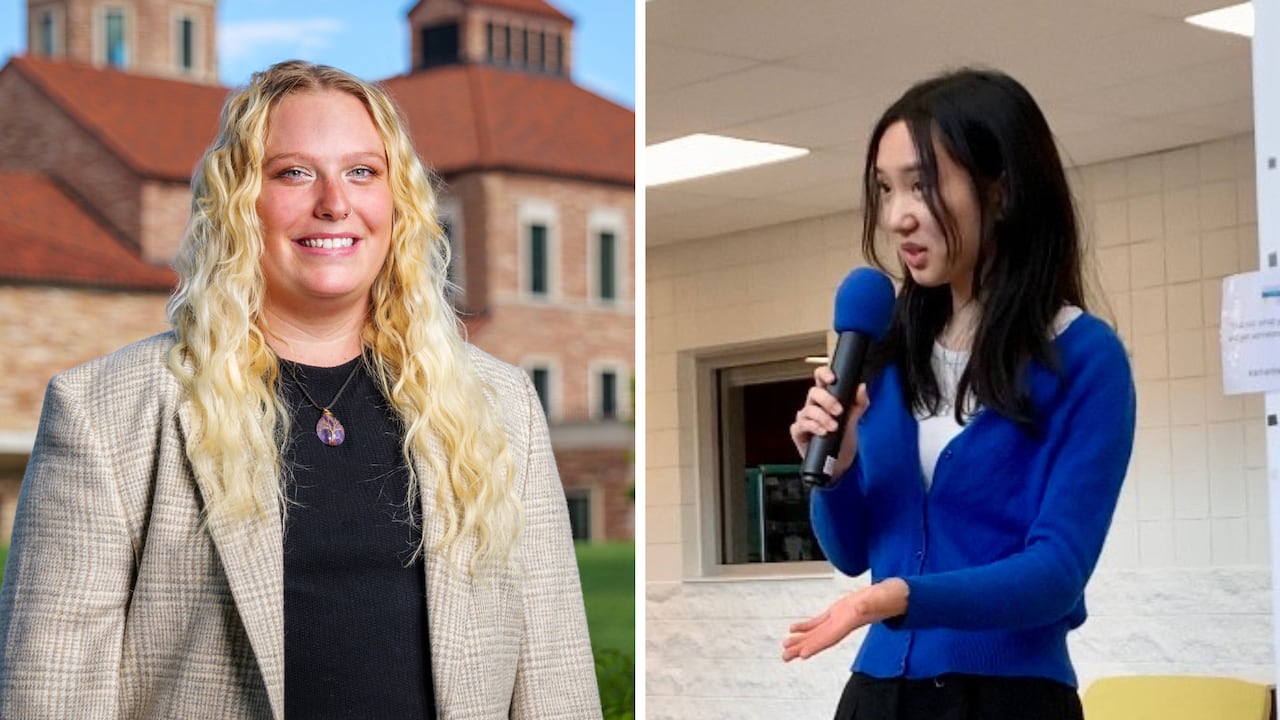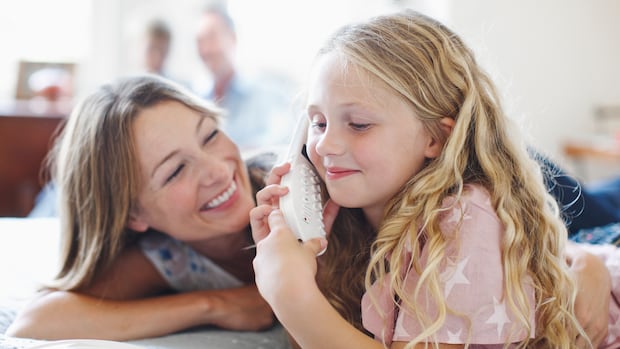The Current23:51Parents are saying ‘no’ to smartphones for kids, here’s why
When Lindsay Matheson’s tween daughter started to ask her for a smartphone, she didn’t get one right away.
Instead, her mother took a different approach: she dialed back the clock and encouraged her daughter to use the family’s landline.
“She did, she tried, but [my daughter] was just so aghast that I would suggest it,” Matheson, who lives in Toronto, told The Current’s Matt Galloway.
“She joked with me that it was the equivalent of, if I gave her a parchment and a quill, and she would write a letter to her friends and mail it off, and hear back from them in a couple of weeks.”
With growing concerns about the safety of kids online, parents and others are trying new — and old — measures to counter it.
Matheson saw the landline as a way to help her daughter stay connected without diving headfirst into endless scrolling, social media pressure or potentially harmful content.
Matheson’s friend and fellow parent, Maggie O’Connor, said she found herself on a similar path with her own daughter.
“I got the landline to satisfy her wanting a phone and me not wanting to share my phone anymore,” said O’Connor.
Growing up online
Maddie Freeman agrees that the concerns are real. She says she got her first cellphone at age 12 and quickly became consumed by it, “tweeting and posting” on social media late into the night while schoolwork and hobbies fell by the wayside.
Now 24, Freeman says she found herself comparing her life to the unrealistic standards of Photoshopped models or people constantly going on vacation, and while also being exposed to harmful content like so-called “weight-loss challenges” and self-harm posts.
“I wish that, in hindsight, I didn’t have access to this technology,” said Freeman.
It was a similar experience for Isabella Wen, a Grade 12 student in Vancouver who received her first phone at age 10. Like Freeman, she says she became addicted and struggled to manage her usage. Eventually, she resorted to locking her phone away in a cookie box-style time locking container just to get control.
“I definitely [experienced] a lot of social comparison and a lot of unhealthy habits that I wasn’t ready to handle,” said Wen.

Freeman, who’s based in Denver, launched a non-profit called NoSo November in 2020 to encourage young people to unplug or reduce their social media use for one month each year. It aims to raise awareness about the harmful impact that social platforms have on the mental health of youth and young adults.
Wen is a NoSo youth leader who also serves on TikTok’s Youth Council to provide input on creating a healthier digital world with its trust and safety team.
Is a smartphone ban the way to go?
The usage of cellphones in Canada has consistently continued to replace landline phones in households. But many media reports suggest landlines are “making a comeback,” as parents try to protect their children from the online world.
In a story reported by The Atlantic, one mom’s decision to get her nine-year-old daughter a landline resulted in as many as 20 families in Portland, Maine, following suit.
Adam Dubé sees this as a broader trend that includes the growing popularity of “dumb” phones or devices without internet access.
Dubé, an associate professor in the department of educational and counselling psychology at McGill University, says these choices reflect “a little bit of a pushback” against the constant presence of screens in kids’ lives.
But the real issue, he argues, isn’t the device itself — it’s the content that it transmits, and how it’s designed to capture and keep a user’s attention.

Campaign urges parents to delay giving kids smartphones until high school
Unplugged Canada is raising the alarm about the impact excess screen time can have on children. Watch Amy Smith’s interview with Jenna Poste, who is part of the Nova Scotia chapter of the group.
“They are designed to constantly give you the type of content that you seemingly like to look at, and [it’s] always giving you new content every time you pick it up,” said Dubé.
And repeated exposure to that content — including idealized, digitally altered and edited images — can negatively impact a child’s self-esteem and body image, he says.
That said, these concerns aren’t entirely new, Dubé said. Similar anxieties surfaced in the 1980s with teen magazines, which were criticized for their impact on how adolescents viewed themselves.
Rather than banning devices outright, Dubé encourages parents to pay attention to how children are using them. Educational apps, creative tools or digital books can be beneficial, he says.
Dubé said age isn’t the best guideline for when to get a child a smartphone. He suggests focusing on readiness: Can the child follow rules? Do they take responsibility for chores without frequent reminders? Do they respect limits on things like TV or other devices?
If a child can calmly discuss and accept boundaries around phone use, they might be ready. If they push back or can’t engage in that conversation, it may be better to wait, he says.
Beyond these individual choices, Dubé also stresses the need for digital literacy, including teaching kids how to behave ethically online and how to critically interpret the information they see.

“We’re trying to teach skill sets to people from an early age to identify, ‘OK, what’s information that is appropriate for me?’” Dubé said.
He adds that digital literacy training can be effective even with children as young as seven, and it’s already a component of curriculum in provinces such as Quebec and Ontario.
Changing social media
When it comes to the harmful effects of social media, Freeman believes the real responsibility lies with the tech companies behind the platforms.
Just as other industries are required to follow “a lot of stringent rules” when it comes to physical products, she says big tech continues to operate in “this Wild West” — and without strong legislation, meaningful change is unlikely, she says.
While individuals can work to build healthier habits while using social media, Freeman says that responsibilities shouldn’t fall solely on the users.
“I wish that these tech companies would see that they’re really harming people and make changes, but … they’re not going to because of the insane profit incentives that they have,” said Freeman.
“I feel that if we can try to reclaim some of our attention and slowly forge healthier habits, that’s a win, but at the end of the day, the onus is on the tech companies and they need to be the ones to really change and look at themselves and look at the way that they’re operating.”



